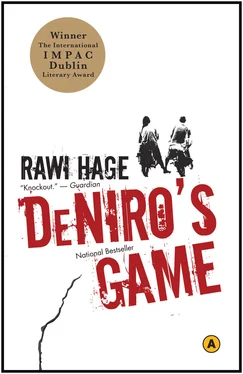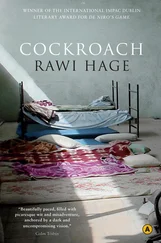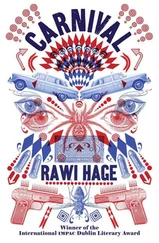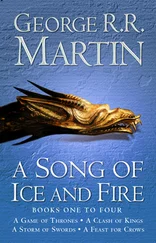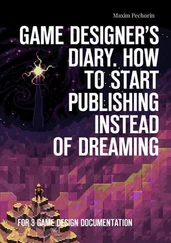Roland winked at me. So, my dear little man, here is what I suggest to you. I hope you like escargots à la sauce au basilic? Bref, here is what I suggest to you. More wine?
He poured himself some more wine, chopped some parsley, then turned and washed his hands. Well, like I said. . Bring your glass here. . Here is what I suggest. Canada.
Canada, I repeated.
Yes. You call this man who knows someone, who knows someone else, who can get you a fake visa to Canada.
Now you are talking like a spy, I said.
Perceptive. Indeed, you are one perceptive young man. Did you come with a passport or just guns? Roland smiled.
Yes, a passport.
Good, not so irresponsible after all. You get on the plane, and when you arrive at the Montreal airport in Canada, you claim refugee status. I will give you the number of the person later. Rhea said she would pay for it all — the ticket and the other fees. She will contact you about it. Now, let’s eat. Oh, by the way, he added, did you happen to see George before you left?
No, I said.
Roland shook his head and led me to my seat at the table.
THE NEXT MORNING, I went to a public telephone booth.
I called the number Roland had given me. A woman answered. I told her that I was calling about the suit for the wedding that was taking place outside the city.
What is the colour and size of the suit? she asked.
It is blue, and the size is seven.
Good. Where can we meet? she said.
Metro Montparnasse. I will be wearing a white shirt with long sleeves that cover my hands.
Tomorrow morning at eight-thirty, she said. I will find you.
After I hung up, I strolled to a nearby café and ordered a cup of coffee. The waiter was polite and called me Monsieur . I opened a newspaper and went through it slowly.
There was news about a car bomb that had exploded in East Beirut, killing five people and injuring thirty. The photograph showed a woman covered with blood being rushed to an ambulance.
I moved closer to the café window and stared at the photograph. I tried to see if I could recognize the woman or anyone else in the photo. The caption read “Achrafieh,” which was where I had lived. The ground was covered with glass and rubble, and in the background a man pointed to the balcony above him. The story in the paper was disconcertingly factual, without story or investigation.
Try as I might, I could not recognize anyone in the photo. So I sipped my coffee, and when the waiter was looking away, I carefully ripped out the page, folded it with my hands under the table, and put it in my pocket.
I made my way back to my hotel and up to my room. There, I pulled the page from my pocket and laid it on the desk. Then I lay in bed and looked at the walls. After a while, I picked up my book. I was on the last few pages. I read, I informed him that I’d been staring at the walls for months, there was nobody, nothing in the world. . A life which I can remember, this life on earth. That is all I want from it .
I closed the book and looked at the sun, which had come into the room like melancholy consolation.
THAT AFTERNOON, I walked to Rhea’s place and waited near her building. I did not ring the bell, but I did make myself conspicuous. I stood in the light. I fretted like the leaves. I smoked, and puffed Native Indian signals, sending her a warning of my coming.
Soon I saw Rhea’s long coat and umbrella sliding above the sidewalks, slowly approaching me, slowly becoming bigger. She saw me, passed me, avoided my look, and went straight to her door.
I approached her and slipped under her umbrella. I talked to Roland, I said to her from under the rain.
Good. Now you can leave.
You want me to leave?
Look, what you did was unforgivable and, to tell you the truth, a little scary. Roland did not want to help at first. I asked him to.
Why are you helping me?
I am doing it for George.
She opened the door to her building, and before she could close it, I held on to the side of it and asked her if I could come in.
She did not answer, so I followed her inside. In the elevator she did not say a word; instead, she looked at her shoes the whole time. Her shoes were shiny black, flat and round, with a little heel, and the rain had beaded on them. I followed her shoes down the long hallway. I followed her black leather shoes like a wet puppy — one of those poodles that fill Paris’s streets with their leashes that expand like spider strings from their owners’ hands.
Rhea opened the apartment door and threw her keys in a bowl. She went to her room and closed the door behind her. Then she came back out and asked me if I was hungry.
No, I said.
Did you call the people?
Yes.
Good, so you decided.
No, but I did call them.
You have no future here; you have to leave.
I held her hand and drew her close to me. She tried to pull away, but I held her firm. She hid her face from me, veiling it with her soft hair. I lifted her hair slowly, and I caressed her face. She stood there, motionless, hesitant. I kissed her on the cheek, then on the neck. When I reached her lips, she kept them closed.
You are wet, she said. You’d better go home and change your clothes. She gently pushed me away. Call me when you get the visa. I will book the ticket.
I left her apartment and retraced my poodle-wet tracks along the hallway. When I looked back, I saw she was watching me from a small opening in her doorway.
THE NEXT DAY, I stood at the Montparnasse metro entrance. A woman in her forties pulled at my long sleeves and smiled. She walked ahead of me, and I followed her. We ended up in a small park with a few benches. She sat down and looked me in the face.
When did you get here?
A few weeks ago.
She nodded. From where?
Lebanon.
The situation is bad there, she said in an accent I could not recognize. Why did you leave?
I am not welcome there any more.
Not welcomed by whom?
By the people in power.
Could you be less vague, please?
You need the story? I asked. I was accused of killing someone, but I did not do it. I was tortured.
Did you go through a trial?
No.
Who tortured you?
The militia.
Why?
Like I said, because they accused me of stealing, and of killing someone!
You said killing first. You did not say stealing.
Well, that too.
Tell me more about the torture. Were you tortured alone, or with a friend, or someone from your family?
Alone.
How?
I told the woman about Rambo. About the water bath, and how he dipped my head in it, and how he would pull it back just before I suffocated. I told her about the sleep deprivation, the car trips, and the long interrogations.
And why do you think they chose you?
I was singled out because I smoke drugs, and I believe also because the leader knew my uncle was a communist.
The woman asked me many questions. She wanted details, like my full name, my age, and when exactly I had left.
The reason I asked to meet, she said, is first because I need your passport, and second just so that you know we do not do this for profit. We do it only for people who are refugees. We are an underground humanitarian organization. Do you understand that?
Yes, I said.
Good. Do you have your passport on you?
Yes.
Good.
You see the taxi there?
The small white car? I asked.
Yes.
After I leave, you take that car and let the driver take you home. Leave him your passport. We will let you know when the visa is done. And please do not try to make conversation with the driver, and do not call the number again. Avoid policemen and crowded public places. Do not get arrested. We will reach you when everything is done.
Читать дальше
